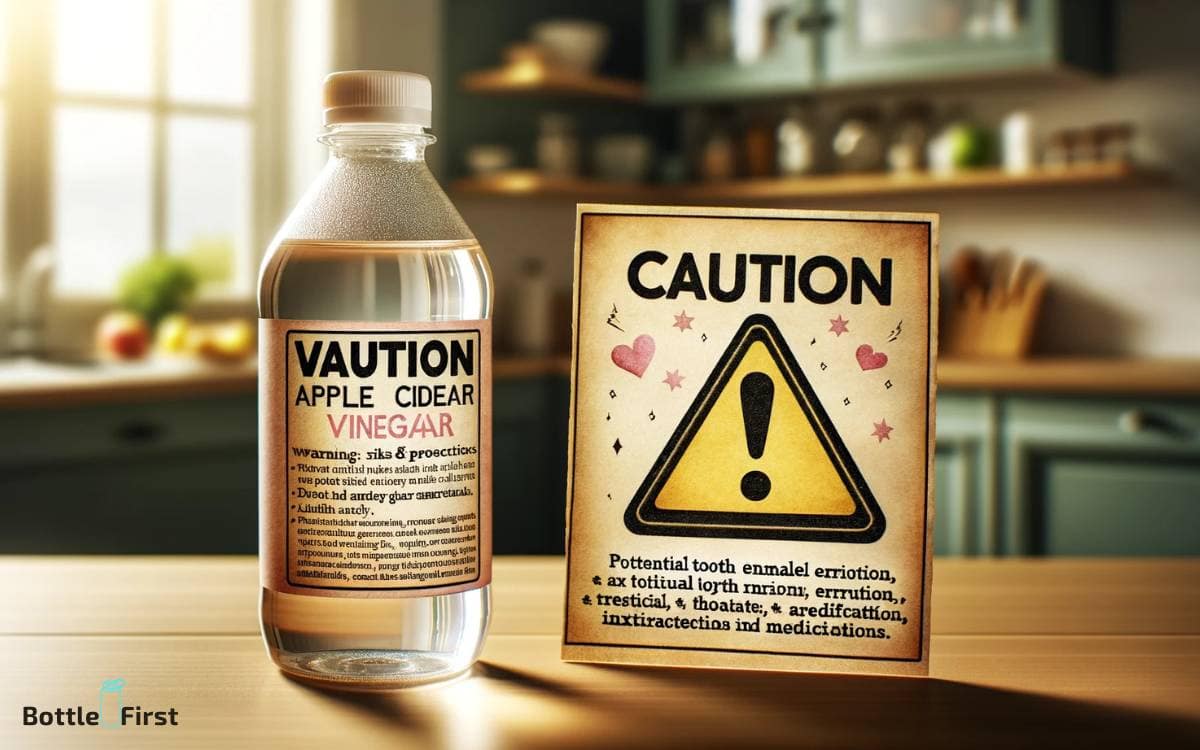Can I Put Apple Cider Vinegar in My Water Bottle? Yes!
Yes, it is possible to infuse your water with apple cider vinegar. Enhance your daily water intake by mixing in 1 to 2 tablespoons of ACV per bottle of water.
This mixture may aid digestion, support weight management efforts, and promote better metabolic health.
Remember to start with a smaller amount to assess tolerance and always dilute ACV to protect your teeth and stomach lining.
Adding ACV to your hydration routine could offer a straightforward yet beneficial tweak to your health regimen.
Key Takeaway
Health Benefits of Apple Cider Vinegar in Water
When added to water, apple cider vinegar offers various potential health benefits. This fermented liquid contains acetic acid, which has been studied for its potential to aid in weight management by promoting a feeling of fullness and reducing the storage of fat.
Additionally, apple cider vinegar may help regulate blood sugar levels by improving insulin sensitivity, making it a potential asset for individuals with diabetes or those at risk of developing the condition.
Some studies suggest that it may also have antimicrobial properties, aiding in the fight against certain types of bacteria.
However, it’s important to note that more research is needed to fully understand the extent of these benefits and their impact on overall health.
Moving forward, it’s crucial to consider the risks and precautions associated with consuming apple cider vinegar in water.
Risks and Precautions to Consider
Considering the potential health benefits of adding apple cider vinegar to water, it is important to be aware of the associated risks and precautions.
While apple cider vinegar is generally safe for consumption, there are some potential risks to be mindful of.
The high acidity of apple cider vinegar may cause irritation to the throat and stomach lining, especially if consumed in large quantities or undiluted. It can also erode tooth enamel over time, leading to dental issues.
Additionally, individuals on certain medications or with specific health conditions should exercise caution, as apple cider vinegar may interact with medications or exacerbate certain health issues.
To minimize these risks, it is advisable to dilute apple cider vinegar in water and consume it in moderation.
It is recommended to consult a healthcare professional before incorporating apple cider vinegar into your daily routine, especially if you have any underlying health concerns.
Tips for Adding Apple Cider Vinegar to Your Water Bottle
To ensure the safe and effective incorporation of apple cider vinegar into your water bottle, it is important to follow some key tips and guidelines.
Firstly, always dilute the apple cider vinegar before adding it to your water bottle to avoid any potential damage to your teeth or throat due to its acidity. A recommended ratio is one to two tablespoons of apple cider vinegar per 8 ounces of water.
Secondly, consider adding natural sweeteners like honey or stevia to balance the strong taste of apple cider vinegar.
Additionally, it is advisable to use a high-quality, BPA-free water bottle to prevent any chemical reactions or leaching.
Lastly, shake the water bottle well before drinking to ensure an even distribution of the apple cider vinegar.
Following these tips will help you enjoy the benefits of apple cider vinegar in a safe and enjoyable manner.
Best Practices for Mixing Apple Cider Vinegar With Water
Incorporating apple cider vinegar into your water bottle requires careful consideration of the best practices for mixing to ensure both safety and optimal flavor.
To achieve the perfect blend, consider the following innovative techniques:
- Use high-quality, raw, unfiltered apple cider vinegar to preserve its health benefits and rich flavor.
- Add a small amount of raw honey or a natural sweetener to balance the tartness and enhance the overall taste.
- Experiment with infusing your water with fresh herbs or fruits like mint, lemon, or berries to create a refreshing and flavorful concoction.
Potential Effects on Hydration and Wellness
After carefully considering the best practices for mixing apple cider vinegar with water, it is important to explore its potential effects on hydration and wellness.
While apple cider vinegar may offer certain health benefits, such as aiding digestion and promoting a feeling of fullness, its impact on hydration is a point of consideration.
The acetic acid in apple cider vinegar has the potential to reduce the body’s natural electrolyte levels, which are essential for maintaining proper hydration.
However, when consumed in moderate amounts and adequately diluted in water, apple cider vinegar is unlikely to cause significant dehydration.
As with any dietary addition, it is crucial to be mindful of individual tolerance and to prioritize a balanced approach to hydration and wellness.
Further research is necessary to fully understand the holistic impact of apple cider vinegar on the body’s hydration and overall well-being.
Conclusion
Incorporating apple cider vinegar into your water bottle can provide potential health benefits, but it’s important to be aware of the risks and precautions associated with its consumption.
When mixed properly, apple cider vinegar can be a refreshing and healthy addition to your daily hydration routine.
According to a study from the Journal of Food Science, apple cider vinegar has been shown to improve insulin sensitivity and aid in weight management.






